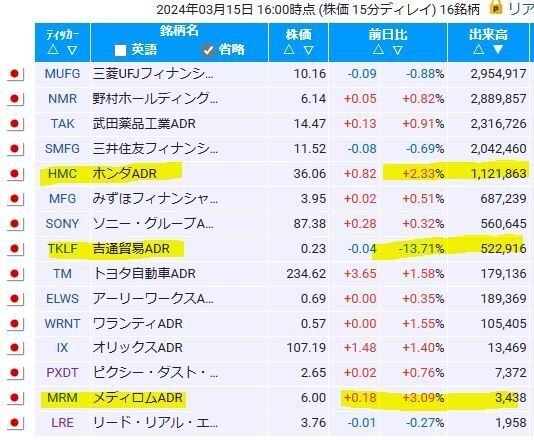
2024 Mar 15, US Market



Stocks fell Friday, closing out another weekly loss after hotter-than-expected inflation data rattled markets.
Reports on consumer and producer prices released earlier this week reflected higher inflation than economists anticipated, undercutting investors’ hopes that the Federal Reserve could soon begin cutting interest rates. Fed Chair Jerome Powell has said the central bank was looking for greater confidence that inflation was returning to its 2% target.
Bond yields climbed. The yield on the 10-year U.S. Treasury note—a benchmark for borrowing costs on everything from mortgages to corporate loans—jumped to 4.303%, from 4.088% the week prior.
Growth-oriented areas of the stock market struggled. Shares of companies expecting windfalls in the future tend to be hurt by elevated interest rates. Information technology and communication services were the two worst-performing sectors of the S&P 500 on Friday, each down more than 1%. An index of chip stocks, the PHLX Semiconductor Index, fell 4% this week in its worst weekly performance since January.
Friday also marked a “triple witching,” the quarterly event when derivatives contracts tied to index options, index futures and single-stock options expire on the same day. The flurry of contracts expiring at the same time can lead to heightened volatility.
Meanwhile, U.S. consumers appeared a little less optimistic. The University of Michigan’s monthly measure of U.S. consumer sentiment released Friday came in lower than economists anticipated.
Though Fed officials are broadly expected to keep interest rates unchanged at their policy meeting next week, investors are looking to the meeting for more clarity about when the central bank could begin lowering rates. Traders are pricing in a roughly 9% chance of a rate cut in May, down from about 24% a week ago, according to CME’s FedWatch Tool.
Among individual stocks, Adobe shares slid 14% on Friday after the software company’s latest results topped forecasts, but guidance for its current quarter disappointed investors. Ulta Beauty’s stock fell 5.2% after the company warned of slowing growth in the beauty industry and offered full-year earnings guidance that missed Wall Street’s expectations. Fisker shares rose 13% after the embattled electric-vehicle maker played down talks of a potential bankruptcy filing.





Adobe (ADBE) reported upbeat Q1 results and approved a buyback of up to $25B in common stock
Ulta Beauty (ULTA) reported better-than-expected Q1 earnings and revenue and provided FY24 guidance
Jabil (JBL) reported mixed Q2 results and provided its outlook for Q3 and FY24
The National Association of Realtors agreed to a settlement that may lower commissions
JD.com (JD) said it does not intend to make an offer for Currys
Boeing (BA) had advised airlines to check 787 cockpit seat switches, WSJ reports
Nissan (NSANY) and Honda (HMC) have agreed to start talks on a potential partnership, Nikkei Asia reports
Samsung (SSNLF) is slated to win over $6B for expanded U.S. investment, Bloomberg reports
Uber (UBER) and Lyft (LYFT) will exit Minneapolis due to a ride-hailing pay hike rule, Fox 9 reports
Apple (AAPL) will pay $490M to settle a lawsuit over CEO Tim Cook's China iPhone sales comments, Reuters reports
Groupon (GRPN) reported upbeat Q4 results, adding that there is no longer substantial doubt about its ability to continue as a going concern
PagerDuty (PD) reported better-than-expected Q4 results but provided a conservative outlook for Q1 and FY25
Piper Sandler upgraded DoorDash (DASH) to Neutral from Underweight with a price target of $127, up from $53, after a change in analyst coverage. While delivery may be a less "sticky" service than mobility, management's execution has been impressive, the analyst tells investors in a research note.
B. Riley upgraded Madrigal Pharmaceuticals (MDGL) to Neutral from Sell with a price target of $270, up from $155, after the FDA granted a timely approval to Rezdiffra. The label exceeded the Street's expectation in terms of not requiring biopsy for treatment initiation and monitoring, and limited monitoring requirements specific to on-target liabilities, the analyst says.
Guggenheim upgraded Snowflake (SNOW) to Neutral from Sell without a price target. The analyst believes Snowflake "has a mountain of challenges in front of it that will continue to feed material investor worry, and this likely won't dissipate any time soon," but the firm believes the company "will remain a valuable asset."
Morgan Stanley upgraded nCino (NCNO) to Equal Weight from Underweight with a price target of $27, up from $24. The firm says the market is now expecting nCino's fiscal 2025 estimates to be in-line with its below-consensus estimates.
Piper Sandler upgraded Rivian Automotive (RIVN) to Overweight from Neutral with a price target of $21, up from $15. After watching last week's live stream, re-assessing the capex outlook, and considering the post-Q4 selloff, the firm says it feels "compelled to upgrade" the stock, but adds: "Make no mistake: buying RIVN is risky and a botched midyear re-tooling effort could yet surprise investors negatively."
Morgan Stanley downgraded Republic Services (RSG) to Equal Weight from Overweight with an unchanged price target of $199. The firm says that with the stock trading two standard deviations above its historical valuation average, it sees a more balanced risk/reward from here, particularly as it expects core price to moderate in 2024.
JMP Securities downgraded Oportun Financial (OPRT) to Market Perform from Outperform without a price target. In the absence of either a sale or wind down of the loan portfolio, the business will continue to deliver net losses and underperform peers, the analyst tells investors in a research note.
RBC Capital downgraded Berry Global (BERY) to Sector Perform from Outperform with a price target of $62, down from $72. The firm continues to believe Berry is executing well on cost initiatives and generating free cash flow, but is less optimistic now, as it believes volumes may continue to be challenged in the near-term.
Piper Sandler downgraded Polestar Automotive (PSNY) to Neutral from Overweight with a price target of $2, down from $3, as part of the firm's sector-wide coverage update. The firm likes Polestar's "emotive designs," but given the relentless nature of recent EV price cutting, it is concerned about the company's relatively high price points.
Seaport Research downgraded Discover (DFS) to Neutral from Buy. The company's credit trends in February on the card portfolio showed additional signs that delinquency formations may be peaking, although charge-off trends were above expectations, the analyst tells investors in a research note.
Piper Sandler initiated coverage of General Motors (GM) with a Neutral rating and $44 price target. GM is "basically a U.S. pure-play that sells gasoline trucks and SUVs" that is committed to 100% EVs, but the firm questions "will customers respond?"
Citi initiated coverage of Pure Storage (PSTG) with a Buy rating and $65 price target. With 100% of its portfolio based on all-flash, Pure participates in the highest-growth sub-segment of external storage, the analyst tells investors in a research note.
BofA initiated coverage of Expeditors (EXPD) with a Neutral rating and $126 price target. The company's margins have been reset down following the COVID "boom" and the stock's valuation remains full, the analyst says.
Craig-Hallum initiated coverage of PowerFleet (PWFL) with a Buy rating and $9 price target. The firm sees the merger with Mix Telematics as a huge growth driver for FY24 and beyond, not only showing huge upside from a SaaS standpoint, but a "one plus one equals three" scenario forming from the company's business, the firm says.
Truist initiated coverage of Golden Entertainment (GDEN) with a Buy rating and $45 price target. The analyst says Golden is now a Nevada pure-play, benefiting from favorable population trends and a stable low-tax regulatory environment.
この記事が気に入ったらサポートをしてみませんか?
